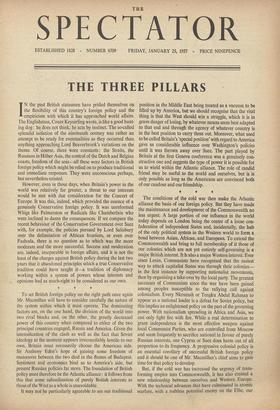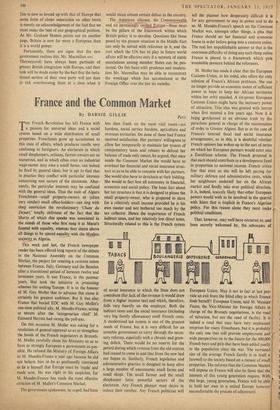THE THREE PILLARS
IN the past British statesmen have prided themselves on the flexibility of this country's foreign policy and the empiricism with which it has approached world affairs. The Englishman, Count Keyserling wrote, is like a good hunt- ing dog : he does not think; he acts by instinct. The so-called splendid isolation of the nineteenth century was rather an attempt to be ready for eventualities as they occurred than anything approaching Lord Beaverbrook's variations on the theme. Of course, there were constants : the Straits, the Russians in Hither Asia, the control of the Dutch and Belgian coasts, freedom of the seas—all these were factors in British foreign policy which might be relied on, to produce traditional and immediate responses. They were unconscious perhaps, but nevertheless existed.
However, even in those days, when Britain's power in the world was relatively far greater, a threat to our interests would be met with due consideration for the Concert of Europe. It was this, indeed, which provided the essence of a genuinely Conservative foreign policy. It was unreformed Whigs like Palmerston or Radicals like Chamberlain who were inclined to damn the consequences. If we compare the recent behaviour of the Conservative Government over Suez with, for example, the policies pursued by Lord Salisbury over the delimitation of African frontiers, or even over Fashoda, there is no question as to which was the more moderate and the more successful. Success and moderation are, indeed, inseparable in foreign affairs, and it is not the least of the charges against British policy during the last two years that it abandoned principles which a true Conservative tradition could have taught it—a tradition of diplomacy working within a system of powers whose interests and opinions had as much-right to be considered as our own.
*
To set British foreign policy on the right path once again Mr. Macmillan will have to consider carefully the nature of the system within which it must operate. The dominating factors are, on the one hand, the division of the world into two rival blocks and, on the other, the greatly decreased power of this country when compared to either of the two principal countries engaged, Russia and America. Given the intensification of the clash as well as the fact that Soviet ideology at the moment appears irreconcilably hostile to our own, Britain must necessarily choose the American side. Sir Anthony Eden's hope of gaining some freedom of manoeuvre between the. two died in the flames of Budapest. Sentiment and economics bind us to America's side, but present Russian policies far more. The foundation of British policy must therefore be the Atlantic alliance : it follows from this that some subordination of purely British interests to those of the West as a whole is unavoidable.
It may not be particularly agreeable to see our traditional
position in the Middle East being treated as a vacuum to be filled up by America, but we should recognise that the vital thing is that the West should win a struggle, which it is in grave danger of losing, by whatever means seem best adapted to that end and through the agency of whatever country is in the best position to carry them out. Moreover, what used to be called Britain's 'special position' with regard to America gave us considerable influence over Washington's policies until it was thrown away over Suez. The part played by Britain at the first Geneva conference was a genuinely con- structive one and suggests the type of power it is possible for us to wield within the Atlantic alliance. The role of candid friend may be useful to the world and ourselves, but is is only possible as long as the Americans are convinced both of our candour and our friendship.
* * * The conditions of the cold war then make the Atlantic alliance the basis of our foreign policy. But they have made the maintenance and development of the Commonwealth no less urgent. A large portion of our influence in the world today depends on London being the centre of a loose con- federation of independent States and, incidentally, the hub of the only political system in the Weitern world to form a bond between Asian, African, and European. To extend the Commonwealth and bring to full membership of it those of our colonies which are not yet entirely self-governing is a major British interest. It is also a major Western interest. Ever since Lenin, Communists have recognised that the easiest way to attack capitalist States was through their colonies— in the first instance by supporting nationalist movements, then by organising a take-over by the local party. The greatest successes of Communism since the war have been gained among peoples susceptible to the rallying call against colonialism. Every Nkrumah or Tengku Abdul Rahman to appear as a national leader is a defeat for Soviet policy, but this implies an enlightened policy on the part of the governing power. With nationalism spreading in Africa and Asia, we can only fight fire with fire. While a real determination to grant independence is the most effective weapon against local Communist Parties, who are controlled from Moscow and seem frequently to sacrifice national in favour of purely Russian interests, one Cyprus or Suez does harm out of all proportion to its frequency. A progressive colonial policy is an essential corollary of successful British foreign policy and it should be one of Mr. Macmillan's chief aims to gain time for that policy to develop.
But, if the cold war has increased the urgency of trans- forming empire into Commonwealth, it has also created a new relationship between ourselves and Western Europe. With the technical advances that have culminated in atomic warfare, with a ruthless potential enemy on the Elbe, our
fate is now so bound up with that of Europe that some form of closer association on other levels is merely an acknowledgement of the fact that we must make the best of our geographical position. As Mr. Graham Hutton points out on another page, Britain is now far more a European than it is a world power.
Fortunately, there are signs that the new government realises this. Mr. Macmillan and Thorneycroft have always been partisans of greater British integration with Europe, and their task will be made easier by the fact that the isola- tionist section of their own party will not dare to risk overthrowing them at a time when it would mean almost certain defeat in the country.
The American alliance, the Commonwealth and an increasingly urnfiakrope—these must be the pillars of the framework within which British policy is to develop. Questions like those posed by the present situation in the Middle East can only be solved with reference to it, and the part which the UN has to play in future world affairs will be effective only if a network of stable associations among member States can be, pro- moted. On this basis with prudence and modera- tion Mr. Macmillan may be able to reconstruct the wreckage which has accumulated at the Foreign Office over the last six months.



































 Previous page
Previous page